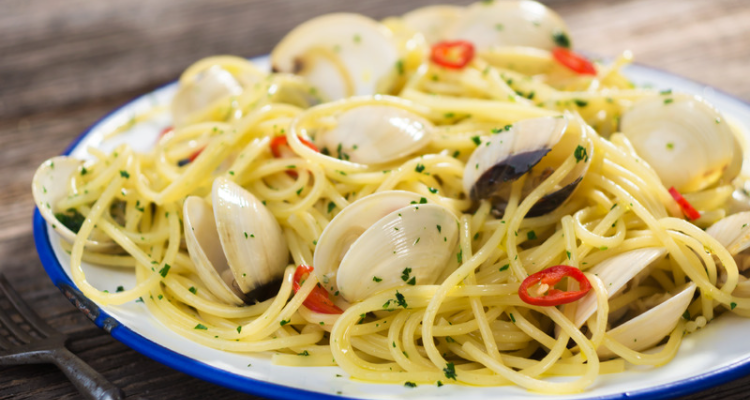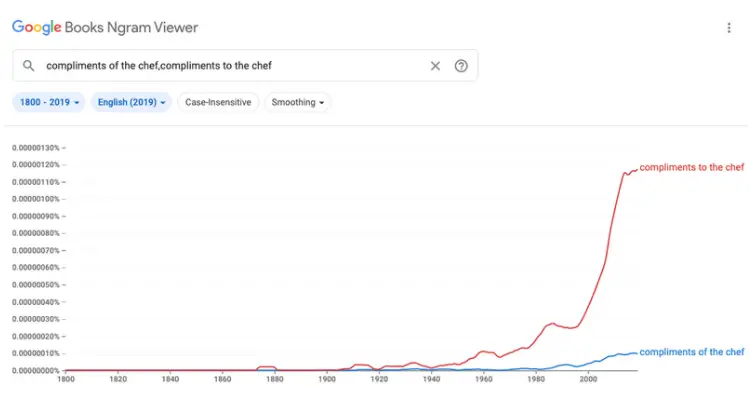You’ve seen characters in movies say, “send my compliments to the chef”, and you’re thinking do people say this in real life? What does it mean? Do chefs even care that you’ve said it? In this post I’ll lay the best way to thank a chef for an amazing meal.
Compliments to the chef meaning
Compliments to the chef means that you would like the chef to know that you thought the meal they cooked for you was delicious. In the phrase ‘compliments to the chef’, the word ‘compliments’ is an expression of praise and appreciation. You’re telling the waiting staff to tell the chef that you were impressed with the meal.
Don’t confuse compliment with complement. Complement means to make something complete. For example, gravy complements your Christmas dinner.

When is it appropriate to say compliments to the chef?
You can say compliments to the chef any time you’re impressed by a meal in a restaurant. Usually, it will be in restaurants that have a chef that creates a unique menu. You wouldn’t say it in Nando’s or McDonald’s. Well, maybe ironically. You wouldn’t usually say it in any chain restaurant with a national menu, but if the cuisine blows you away, there’s no harm in showing your gratitude and appreciation to the chef this way.
Is saying compliments to the chef pretentious?
Pretentious? Moi? If you’ve never sent your compliments to the chef before, you may feel awkward or even pretentious the first time, especially if you’re young. Don’t worry. Send my compliments to the chef is the correct and legitimate way to let your feelings be known. If it’s a good restaurant, the waiter or waitress will hear this from diners frequently.
Do compliments to the chef actually get passed on by the waiting staff?
Chefs are often very stressed in the kitchen, and the waiting staff can be the ones to bear the brunt of this. When a customer asks the waiting staff to send their compliments to the chef, it gives them a chance to improve the environment by boosting the morale of the chef and his entire kitchen team. For this reason, it would be very unusual for the waiter or waitress to not pass on the compliments. I’ve even heard of waiting staff fabricating compliments when they could see the chef was particularly stressed.

How to thank a chef
The best and easiest way to thank a chef is to ask the waiting staff to “send my compliments to the chef”. The chef and his team always appreciate that. If you want to go a step further, here are my suggestions:
- Write the chef a note, even if it’s on a napkin
- Save a glass of wine in your bottle for the chef
- Order the chef a glass of good wine
- Leave glowing reviews on Yelp, TripAdvisor, Facebook, etc.
- Become a regular of their restaurant!

How to thank a chef in a large kitchen
If you’re at a restaurant with a large kitchen, such as a hotel, remember that there are multiple chefs, and the head chef may not have contributed anything to your meal. In this case, I would suggest that you mention the dish that you liked, “send my compliments to the chef, the halibut was out of this world”, so the correct chef gets the credit. I have read chefs online saying how they resent the head chef taking the credit for their work.
I would not recommend sending a glass of wine to a large kitchen and hoping it finds its way to the individual that cooked your meal. If you’re feeling flush and want to send a gift, you can buy the kitchen a round of drinks or send a bottle for them to share.
Should you ask the chef to come out to your table?
In small boutique restaurants, it is common for the chef to come out and talk with the guests at the end of the night. I once had the pleasure of an Italian chef coming to my table with a bottle of limoncello (an Italian lemon liqueur) after our meal. I’m not sure if he does this every night or if it was because we had sent him our compliments. He handed out the shot glasses, and we polished off the bottle (we were a large group, I promise) while he revealed how he made his spaghetti vongole so delicious.

Should you ask the chef to come to your table? It depends. If the restaurant is in the middle of the dinner service, then the chef will be busy. They will appreciate you asking and probably won’t decline as not to appear rude. You would be adding extra stress to the kitchen, though. I think it’s better to send your compliments without asking the chef to come to your table. If they come, they come. If the dinner service has finished, I don’t see the harm of asking the waiter or waitress to invite the chef to your table so you can thank him or her.
Compliments of the chef meaning

The word ‘compliments’ also has another slightly different meaning: ‘to show warmth, greetings or regard by giving a gift’. So the phrase ‘compliments of the chef’ is said by the waiting staff to the guest when they’re giving something free. Perhaps a sorbet between courses or petit fours with your coffee. Sometimes they will say ‘courtesy of the chef’, which means the same thing.
Compliments to the chef history

Google Ngram viewer searches books to find mentions of a given phrase over time. The graph above shows that both ‘compliments to the chef’ and ‘compliments of the chef’ came into use in literature in the early 1900s. Of the two phrases, ‘compliments to the chef’ is used much more frequently.
The earliest mention of ‘compliments to the chef’ was in ‘Lippincott’s Monthly Magazine, a Popular Journal of General Literature’ published by J. B. Lippincott & Co. way back in 1877. On page 598, there is the line, “Rottenböter, you will have the kindness to present my compliments to the chef of this hotel, and tell him I approve of his hare ragoût. He may serve it more frequently for my déjeuner.’
The earliest mention of ‘compliments of the chef’ came later in 1915 in the ‘Farm Journal Volume 39’ published by the W. Atkinson Company on page 38: “In a few minutes down came a waiter with four large slices of this bread with the compliments of the chef“.
These examples are the origin of the phrase, in literature at least.


